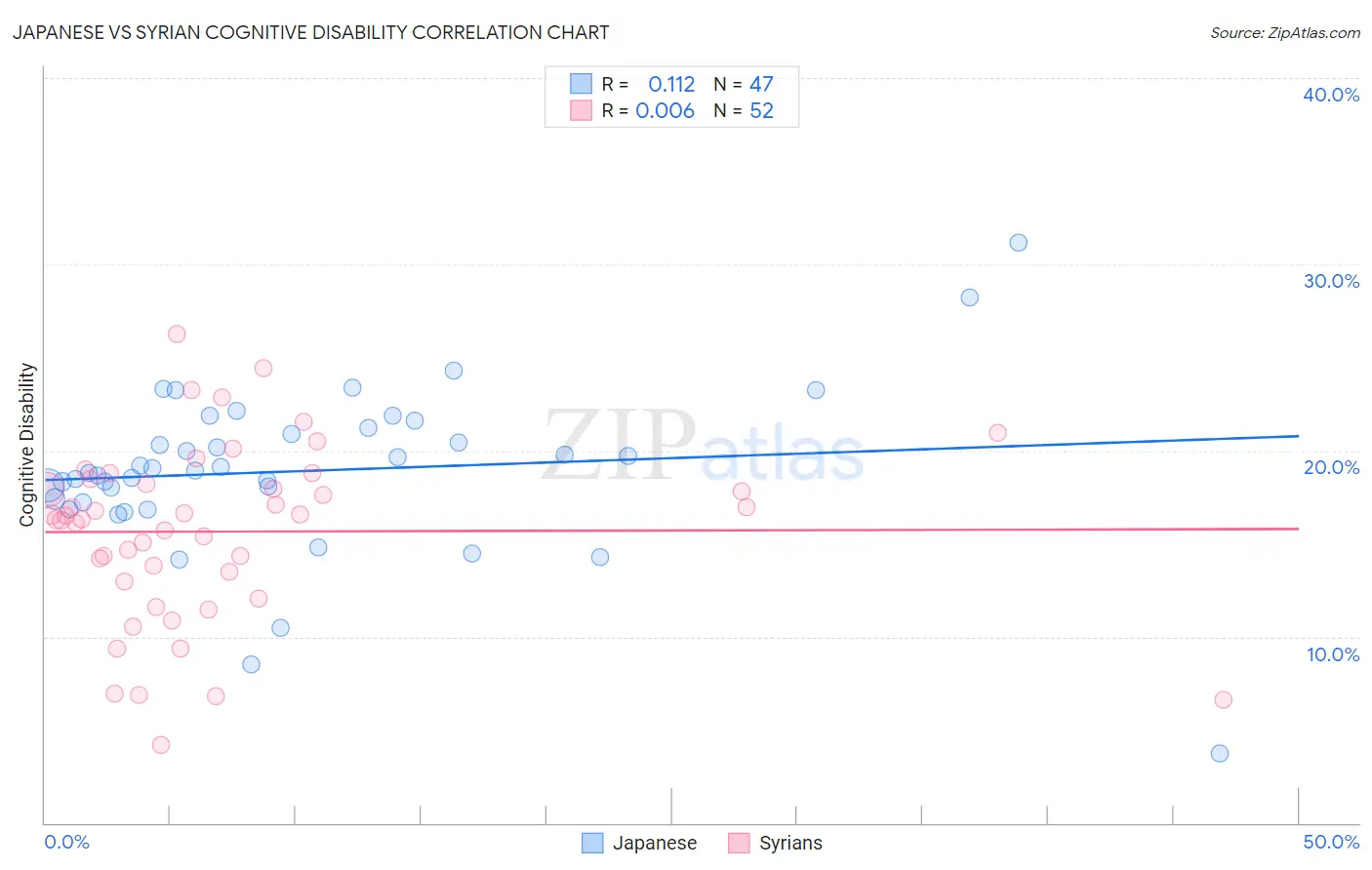Japanese vs Syrian Cognitive Disability
COMPARE
Japanese
Syrian
Cognitive Disability
Cognitive Disability Comparison
Japanese
Syrians
18.3%
COGNITIVE DISABILITY
0.0/ 100
METRIC RATING
298th/ 347
METRIC RANK
17.1%
COGNITIVE DISABILITY
83.0/ 100
METRIC RATING
151st/ 347
METRIC RANK
Japanese vs Syrian Cognitive Disability Correlation Chart
The statistical analysis conducted on geographies consisting of 249,155,070 people shows a poor positive correlation between the proportion of Japanese and percentage of population with cognitive disability in the United States with a correlation coefficient (R) of 0.112 and weighted average of 18.3%. Similarly, the statistical analysis conducted on geographies consisting of 266,316,682 people shows no correlation between the proportion of Syrians and percentage of population with cognitive disability in the United States with a correlation coefficient (R) of 0.006 and weighted average of 17.1%, a difference of 6.9%.

Cognitive Disability Correlation Summary
| Measurement | Japanese | Syrian |
| Minimum | 3.7% | 4.2% |
| Maximum | 31.2% | 26.3% |
| Range | 27.4% | 22.0% |
| Mean | 18.9% | 15.6% |
| Median | 18.9% | 16.4% |
| Interquartile 25% (IQ1) | 17.2% | 13.2% |
| Interquartile 75% (IQ3) | 21.2% | 18.3% |
| Interquartile Range (IQR) | 4.0% | 5.1% |
| Standard Deviation (Sample) | 4.5% | 4.7% |
| Standard Deviation (Population) | 4.4% | 4.7% |
Similar Demographics by Cognitive Disability
Demographics Similar to Japanese by Cognitive Disability
In terms of cognitive disability, the demographic groups most similar to Japanese are Blackfeet (18.3%, a difference of 0.0%), Ghanaian (18.3%, a difference of 0.030%), Creek (18.3%, a difference of 0.060%), Immigrants from Burma/Myanmar (18.2%, a difference of 0.14%), and German Russian (18.2%, a difference of 0.17%).
| Demographics | Rating | Rank | Cognitive Disability |
| Ottawa | 0.1 /100 | #291 | Tragic 18.2% |
| Iroquois | 0.1 /100 | #292 | Tragic 18.2% |
| Central American Indians | 0.1 /100 | #293 | Tragic 18.2% |
| British West Indians | 0.1 /100 | #294 | Tragic 18.2% |
| German Russians | 0.0 /100 | #295 | Tragic 18.2% |
| Immigrants | Burma/Myanmar | 0.0 /100 | #296 | Tragic 18.2% |
| Blackfeet | 0.0 /100 | #297 | Tragic 18.3% |
| Japanese | 0.0 /100 | #298 | Tragic 18.3% |
| Ghanaians | 0.0 /100 | #299 | Tragic 18.3% |
| Creek | 0.0 /100 | #300 | Tragic 18.3% |
| Immigrants | Ghana | 0.0 /100 | #301 | Tragic 18.3% |
| Barbadians | 0.0 /100 | #302 | Tragic 18.3% |
| Immigrants | Kenya | 0.0 /100 | #303 | Tragic 18.3% |
| Immigrants | Eritrea | 0.0 /100 | #304 | Tragic 18.3% |
| Colville | 0.0 /100 | #305 | Tragic 18.3% |
Demographics Similar to Syrians by Cognitive Disability
In terms of cognitive disability, the demographic groups most similar to Syrians are Immigrants from Indonesia (17.1%, a difference of 0.020%), Immigrants from Kazakhstan (17.1%, a difference of 0.12%), Basque (17.1%, a difference of 0.13%), French Canadian (17.1%, a difference of 0.15%), and Cypriot (17.1%, a difference of 0.15%).
| Demographics | Rating | Rank | Cognitive Disability |
| Immigrants | Brazil | 89.3 /100 | #144 | Excellent 17.0% |
| Immigrants | South Eastern Asia | 88.7 /100 | #145 | Excellent 17.0% |
| Costa Ricans | 88.0 /100 | #146 | Excellent 17.0% |
| Scotch-Irish | 85.9 /100 | #147 | Excellent 17.1% |
| French Canadians | 85.7 /100 | #148 | Excellent 17.1% |
| Cypriots | 85.7 /100 | #149 | Excellent 17.1% |
| Basques | 85.5 /100 | #150 | Excellent 17.1% |
| Syrians | 83.0 /100 | #151 | Excellent 17.1% |
| Immigrants | Indonesia | 82.7 /100 | #152 | Excellent 17.1% |
| Immigrants | Kazakhstan | 80.5 /100 | #153 | Excellent 17.1% |
| Immigrants | Malaysia | 79.3 /100 | #154 | Good 17.1% |
| Brazilians | 78.9 /100 | #155 | Good 17.1% |
| Sri Lankans | 78.9 /100 | #156 | Good 17.1% |
| Immigrants | Australia | 76.0 /100 | #157 | Good 17.1% |
| Celtics | 74.1 /100 | #158 | Good 17.1% |